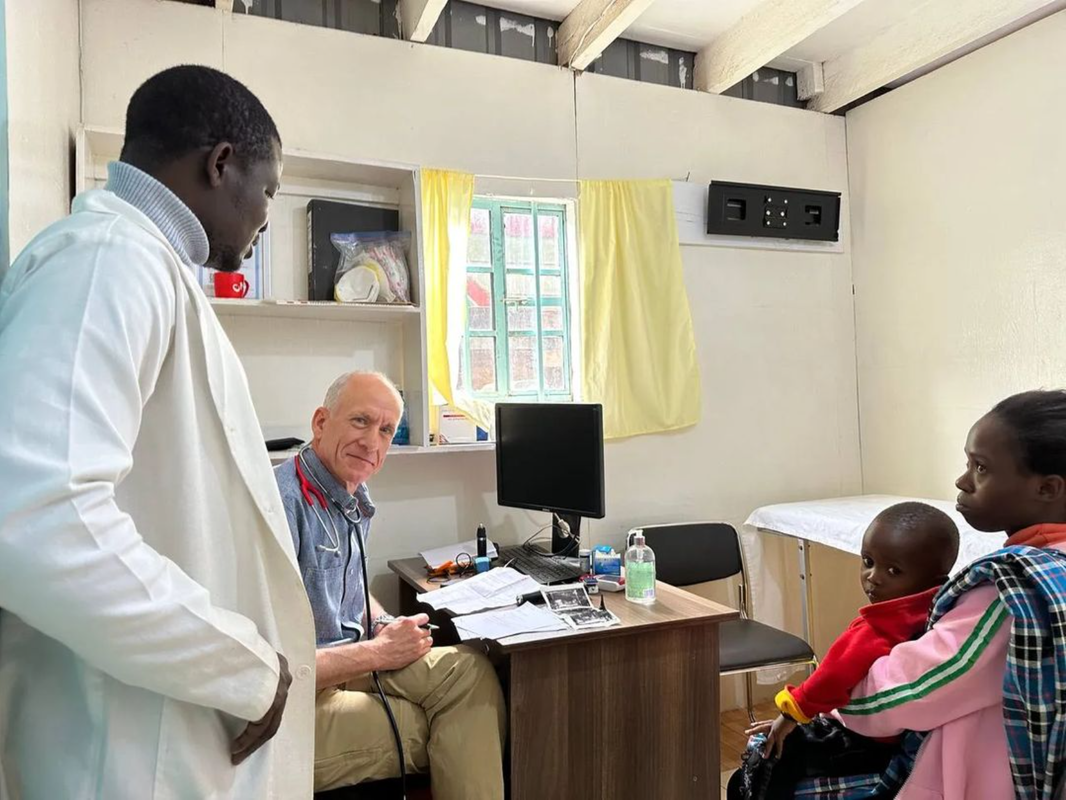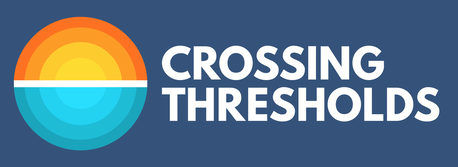|
It was a beautiful day in Kibera, the sky was blue, it was 80+ degrees and dry. January weather in Nairobi is delightful, at least compared to New England. I turned the corner into FAFU School and, at first, was disoriented; it had changed so much since I had last seen it. New buildings and a playground! Among other changes, FAFU had just completed construction on a new clinic where I was to work the next few days. I am a pediatrician, and have been for (oh my god) - a few decades and on my CT trips I usually do a free medical clinic. CT provides some free medications and support for any staff working with me. Medications are surprisingly inexpensive in Kenya compared to the US and we can offer free care and treatment to dozens of local residents. Simeon, the Director at FAFU, usually puts the word out to the neighborhood that we will be there. Last time I worked in a small side office with one small window and no power. The new clinic was quite a change. It was freshly painted, there were new and functioning bathrooms (!), a waiting and reception area, a triage room, a medication room, a lab and 3 exam rooms…quite an expansion from my previous experience. It was a bit disorganized as the paint was still drying. As I walked in, I passed about 20 Kenyans sitting on benches, some of whom had already been waiting hours to see the “European” doctor in the free clinic. Even more were waiting outside. Kenya has national health insurance that costs about $3.25/month (500KS), but even that is beyond what most Kiberans can afford. Some of the neighborhood residents waited hours or even days to see me for the prospect of free care.
FAFU had hired a clinician, Joel Ogumbe, to work in the clinic but it had not yet officially opened. Clinicians in Kenya are equivalent to nurse practitioners or Physicians Assistants in the US. They provide most of the primary care, especially for holders of the national health insurance which covers the vast majority of Kenyans, though most Kiberans are uninsured. The hope for the clinic is that it could attract enough paying/insured patients to keep it going and provide free care to students in the CT schools. Joel and I assembled the staff, a receptionist, and an RN to triage patients. Accompanying us on the trip with CT was Alan, a Dentist and Endodontist who would also see patients. We got to work. Though I am a pediatrician, I saw patients from under a year to almost 80 years of age. In Kibera we see things routinely one almost never sees in the US. Early on the first day, Alan came to me with a question about a pretty sick boy he was seeing. He had three seriously abscessed teeth. His teeth were so infected the entire side of his face was swollen and red. The infected teeth had huge cavities and were not savable. He told us his teeth had been infected for weeks and getting worse. He was in significant pain and struggled to eat. These infections can be quite dangerous at this stage; the infection can spread into the sinuses, the bloodstream, or the brain. He needed urgent treatment. Alan said the teeth had to be pulled and the infection treated, as it was unlikely that without extraction antibiotics would be effective. I agreed, this boy was very sick. I asked Alan if he could pull the teeth safely here. He felt he could easily do it, he had the necessary equipment (Novocain and dental pliers) with him. I told him, “We help who we can with what we have while we are here”. Alan pulled the three abscessed teeth out of that young man quickly and easily... and, as it turned out, a whole lot more teeth in other patients who were truly suffering. The next day one of the boy’s friends brought a handwritten note from the boy on a piece of discarded paper. A thank you note! He thanked Alan for treating him, he felt so much better. He had been in pain for weeks - it was not that his parents did not love him or care - they simply did not have enough money to get him care. He was so grateful to feel better. We help who we can with what we have while we are there. The second day I saw a 39 year old woman who complained of a lump in her left breast. She had seen another doctor who had suggested she get an ultrasound but she could not afford it. When I examined her, she had a large suspicious mass in her left breast and a large firm lymph node in the adjacent armpit. I was pretty sure she has breast cancer. I have experienced this moment a few times in my career; in an instant you see something, or feel something or get a result that will forever change a person’s life…or potentially end it. There is a “before” and now there is an “after”; the person’s life will never be the same. I asked Joel how hard it was to get an ultrasound. Not hard, he replied, as he knew a local radiologist he could call who could do it. The woman said she had no money and no way to get to the radiologist. I asked Joel how much his colleague would charge for the test. He replied an ultrasound in Kenya would cost $25 and if we got a motorbike driver to take her there it would be another $10. I opened my wallet and we arranged the test. $35 to give this woman a chance at life. In an hour I had a nicely typed ultrasound report revealing a large left breast mass strongly suggestive of cancer and a likely metastatic lymph node in her axilla. I talked to her and explained the results. She told me she had three young children dependent on her. I urged her to take the report to one of the large hospitals and seek care and that if she did not, and soon, this disease could kill her. I urged her to do it for her children. She took the report and left. In the US medical field, we talk about healthcare disparities. There are tremendous differences in the exposure and incidence of disease as well as access to and quality of care between differing populations of people with different incomes, races, locales. In medicine, we try to address or at least be aware of these disparities when providing care. Kibera, however, is one giant disparity. Disparities of so many things including the one between hope and reality. In the US, FEMA and other agencies estimate the value of a human life at $7.5 million. Economists calculate this number by asking people how much they would spend to reduce their chance of death by 1/100,000 in the next 12 months. Kibera has done that math for us, the value of a life is something less than $35. We help who we can with what we have while we are there. If nothing else, we can offer hope. At the end of the day, Joel somewhat sheepishly mentioned he had started a GoFundMe for his education. He had grown up in Kibera and a child had watched his mother die of bacterial meningitis because there was no money for doctors or medicine. It is hard for me to imagine what Joel, as a little boy, had gone through. He grew up orphaned and managed to get himself through school and become a clinician. He is committed to working for the people of Kibera, especially the children (he has 2 of his own and another on the way soon!). He wanted to do 2 more years of graduate medical education in Pediatrics to better serve the many kids in Kibera and the CT schools. There are so many kids in Kibera and he wanted to serve not only his community, but the CT schools as well. Education in Kenya is not expensive by US standards but it was way out of his reach financially. That evening I emailed my partners in my practice at the Stamford Health Medical Group Pediatric Center (as we polysyllabically call ourselves) and we all agreed to cover the cost. I could do a little good in the few days I was there seeing patients, but Joel will be there a lifetime. It was a ‘teach a man to fish’ moment and as I write, Joel is about halfway through his pediatric program. We help who we can with what we have while we are there. In the US, doctors have money, another disparity. On my last day I saw an older woman in her 70s, who came in with a variety of complaints. She had high blood pressure but couldn’t afford medication. Her blood pressure was about 190/130, an obligatory ER visit in the US but routine in Kibera. Sadly, I saw lots of patients that week with similar pressures, untreated due to access and cost…a disparity. In my mind I started to do the mental math regarding the increased risk of stroke, heart attack and kidney failure from all the untreated hypertension, a huge burden of chronic disease barely addressed in the daily struggle to survive in Kibera. “I can give you some medicine for your blood pressure for free,” I told her, but explained that she must keep taking it. Joel told her of some places she could buy them for a very reasonable cost. She also had a lot of pain in her knees and ankles. I told her I would take a look and came around my desk and knelt on the floor in front of her. I examined her legs, removed her sandals, well-coated with red African soil and checked her feet for sores or ulcers. As I was doing so I looked up at her and noticed that she had a slightly surprised look on her face. I surmised that in her life, no doctor had ever gotten down on the floor to check her legs and feet. As I examined her I asked her if she had done a lot of heavy work in her life. She sighed and nodded saying she had done laundry most of her life to earn money. Lots of heavy lifting and carrying…not to mention the children she raised. I told her I thought it was not serious but that she had arthritis. I told her that she must have worked very hard and her life of hard labor had taken its toll. She nodded knowingly. I told her I was sorry for her pain, I could not cure it but I could give her free medicine to help control it along with her blood pressure. Joel went to our little pharmacy stocked by CT with meds and she began to gather her things. She held her bag in her lap and looked me straight in the eyes and asked, kindly but with a hint of incredulity: “Why are you doing this?” I was stunned for a second. There was no judgment in her voice, only curiosity. She had unknowingly asked the central question of my professional life, my life as a citizen of earth and the question at the core of CT’s mission. The only answer that came to my tongue was, “Why to help people like you.” She smiled and nodded, gathered her things and left…with some medicine. I could not cure her pain, but I could help control her blood pressure, at least for a while. We help who we can with what we have while we are there. If nothing else we can give kindness and compassion and be prepared to receive it in return. The morning of my last day in Kenya, my cell phone rang at 6 am. It was my wife Maureen. She had been traveling the week before I left for Kenya. I had not seen her for two weeks, the longest time we had ever been apart in our 20 years of marriage. She had been well when I last saw her and generally she was very fit and active, walking 4-5 miles a day with our poodle, Daisy. She had fallen a couple of times in the last two weeks under strange circumstances, but felt fine otherwise except for some unusual fatigue. Her doctor ordered some tests including an MRI of her brain and Maureen had just gotten the results. She had an inoperable brain tumor. We experienced no disparity in care. We had access to the best cancer hospitals and saw the best brain cancer experts in the world. As a physician and a nurse we had spent a lifetime navigating healthcare; we knew who to call and how to get through. It did not matter, there was precious little to be done. She showed almost unbelievable courage and acceptance in her illness but, in four months, she was gone. We help who we can with what we have while they are there. Often, we must accept that nothing can be done. As I write this, I have just returned from 2 weeks in Kenya. Once again to help a few people, including Joel, as he builds a following for the clinic and serves the kids of CT schools. Once again, I face the overwhelming disparity that is Kibera, where so much help is needed and so little is available. Sometimes it feels like the help we muster and the effort we expend is just a tiny island in a great sea of inequity. It is a place that brings the serenity prayer to glaring reality. Once again, I go to confront the tension between agency and acceptance that the experience continues to teach me. We help who we can with what we have while we are there. And by doing so we help ourselves. - Tim Kenefick Crossing Thresholds Board Treasurer
0 Comments
Leave a Reply. |
Archives
May 2024
|


 RSS Feed
RSS Feed
